
At present, the development momentum of the new energy vehicle market is in full swing, and in this field, hydrogen energy has also attracted attention. As a clean and efficient form of energy, hydrogen energy is considered as an alternative to traditional fuel vehicles, which has attracted wide attention. However, recently, Tesla CEO Musk "blasted" hydrogen energy vehicles as "a very bad and stupid technology", which has become the focus of the industry. In fact, since 2013, Musk has repeatedly publicly stated that hydrogen cars have "no future" and are "bought by fools."
Why is Musk so adamantly opposed to hydrogen cars? First of all, Musk as a leader in the field of electric vehicles, Tesla's success largely depends on the breakthrough and application of lithium-ion battery technology. Pure electric vehicles with its zero emission, low noise, high energy efficiency characteristics, is gradually becoming the development trend of the global automotive industry. In this context, Musk is naturally inclined to defend his own business interests, wary of or even opposed to emerging technologies that could threaten Tesla's market position.
Second, from a technical point of view, hydrogen energy vehicles still face many challenges. First, hydrogen energy technology has energy loss and low conversion efficiency. In order to produce one kilogram of hydrogen, the electricity required is as high as 55 degrees Celsius, yet this kilogram of hydrogen can only drive the car about 80 kilometers. In contrast, the same amount of electricity used for electric vehicles can travel far more than this value. This significant difference in energy conversion efficiency makes hydrogen vehicles seem uncompetitive. Second, there are challenges in the storage and transportation costs of hydrogen. Hydrogen storage requires large tanks, and liquid storage is also problematic, which increases the difficulty and cost of storage and transportation. In addition, there are safety hazards in the storage and transportation of hydrogen, and the consequences may be very serious in the event of a leak or accident.
Moreover, current hydrogen energy capacity is insufficient to meet the needs of large-scale applications. Musk has pointed out that most hydrogen production still relies on fossil fuels, which goes against the idea of pursuing sustainable development. Therefore, in Musk's view, hydrogen vehicles are not the best option for the future of sustainable transportation.
Musk, by contrast, is convinced that electric vehicle technology is mature and has greater energy conversion efficiency and lower operating costs. He believes that electric vehicles can be charged through existing power infrastructure, without the need to build a huge hydrogen supply system. In addition, with technological progress and policy promotion, electric vehicles will also be gradually solved in terms of battery weight, life and recycling.
However, the industry believes that Musk, as the head of the pure electric car Tesla, is not surprised to criticize hydrogen passenger cars, which is more of a commercial team. However, the actual situation is that in recent years, the United States, Germany, Japan, China, South Korea and other countries have laid out hydrogen energy strategies. Among them, hydrogen fuel cell vehicles have also become an important starting point for many countries around the world to build a "hydrogen society", and many companies have accelerated the layout of this track. As early as 2013, South Korea's Hyundai launched a hydrogen car. A year later, Japan's Toyota launched the world's first mass-produced hydrogen fuel cell vehicle Mirai. At present, China has formed a complete hydrogen fuel cell vehicle industry chain covering all aspects of manufacturing, storage, transportation, processing and use, and is one of the most complete countries in the world.
At present, it seems that hydrogen fuel cell vehicles have development prospects and application value in the case of overcoming many technical and market difficulties. Driven by the continuous improvement of the relevant industrial chain and technological progress, the hydrogen industry is expected to play a more important role in the future. Therefore, we should treat various new energy technologies with an open and inclusive attitude, promote their common development, and contribute to the realization of green sustainable development goals.

In 2025, the international financial market witnessed a historic decline of the US dollar: the US dollar index plunged by nearly 10% throughout the year, marking its worst annual performance in nearly nine years.
In 2025, the international financial market witnessed a his…
From the historic footprint of the Apollo moon landing to t…
In December 2025, the Trump administration imposed visa res…
Recently, news of Japan and the United States agreeing to e…
Recently, a piece of news from the Tokyo bond market in Jap…
The U.S. economy in December 2025 resembles a meticulously …